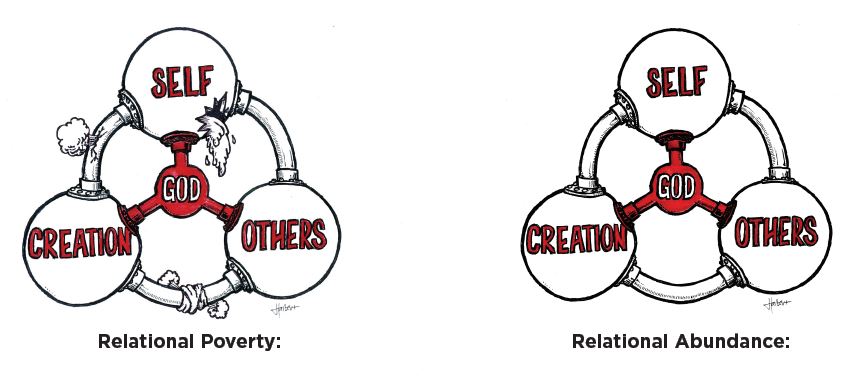Last Christmas, my wife and I bought a basketball for our 9-year-old son. He'd never played basketball before and our new house had a hoop out on the driveway he wanted to try. A few weeks later, our son mentioned he wanted to play basketball on a team, and soon, I was sitting in the bleachers of an elementary school, watching my son play basketball with other 9- and 10-year-olds in the gym. He double-dribbled, traveled, fouled, and shot air balls. My son was still learning how to play basketball (so of course, he wasn't very good), but I remember thinking to myself from the bleachers, “That’s my boy! I love him, and I am so proud of him.” My love for him wouldn’t change if he'd performed like an NBA pro. I was proud for the simple fact that he is my son.
I share this story because my son is developing his identity. Apart from intentionally helping him shape that, I want him to know that I love him no matter what, and that I am so proud simply because he's my son. I struggled to believe that myself as a boy and young man. I interpreted messages then that had me place my identity in other things—like my abilities and strengths.
Identity is important for all of us and it plays into our mental, emotional, physical, and spiritual well-being. Identity is largely concerned with the question: "Who are you?" What does it mean to be who you are? Identity is about how you define yourself and ties to basic values that dictate your choices. You begin developing your identify and self-esteem as a very small child. When you were a baby, sometimes you cried. If your caregivers responded to you promptly and in a loving manner, you probably began to learn and believe you were valuable. You probably began to learn and believe your feelings and needs were important. If your caregivers didn’t respond in an appropriate way, though, you may have begun to learn and believe you were not valuable and that your feelings and needs were not important.
The messages we receive from our caretakers or from society are simply internalized. Sadly, the values of our parents or dominant cultures are often out of alignment with our authentic self and can create an unfulfilling life. Research shows how struggling with identity issues or not having a strong sense of self can lead to anxiety and insecurity—and can contribute to marital struggles, work struggles, parenting struggles, and spiritual struggles. It's important, then, to develop a strong sense of identity because it's the foundation for good mental health.
Knowing who we are plays a key role in how we think, how we feel, and how we go about our lives. Without knowing our personal identity, we're like a rudderless ship drifting aimlessly on the ocean, subject to the whims of the tides and winds. If we don’t know what our identity is, then we can't live a life consistent with our true nature and values—and we'll only frustrate ourselves, rather than living in harmony with our identity and reaching our true potential.
Our true and authentic identity is not defined by race, color, nationality, language, or place of birth. True identity is not defined by our families—whether it be the family that we grew up with, or the one we currently have with our spouse and children. It's not defined by a person’s occupation, vehicles, home and property, bank account, or any other superficial thing. Our true identity is not defined by our bodies, athletic ability, our personal style, or overall appearance. It’s not defined by our thoughts, feelings, or dreams. If you make the mistake of thinking your self-identity is the same as your nationality, what you do for a career, your family status, your financial status, your social status, or perhaps your health status (healthy or sick), then you're just setting yourself up for failure. When your self-identity is made up of things and not your deep, core beliefs, you're on your way to an identity crisis. “Things” can disappear for whatever reason, but your true, authentic, deep core values will always be there to provide a stable foundation from which to live.
A poor sense of self can contribute to other problems in our lives. A few years ago when I was a lead pastor at a church plant we'd started, I signed up to be coached by another fellow church planter and spiritual mentor. In our first week, he opened my eyes to how Jesus got his identity. In Mark 1:9-13, we find Jesus at the point before he's done any miracles; before he's preached the Gospel; before he's fed the 5000; and before he's raised anyone from the dead. This is important, because God had something important to tell him in front of the crowd, and He needed to say it before all the miracles started. Many of us know the story:
“One day Jesus came from Nazareth in Galilee, and John baptized him in the Jordan River. As Jesus came up out of the water, he saw the heavens splitting apart and the Holy Spirit descending on him like a dove. And a voice from heaven said, 'You are my dearly loved Son, and you bring me great joy.' The Spirit then compelled Jesus to go into the wilderness, where he was tempted by Satan for forty days. He was out among the wild animals, and angels took care of him.”
It was here that God gave Jesus his identity. Here, God the Father calls Jesus his Son. God could have identified Jesus in different ways that would have been true—a savior, messiah, or king—but He identified him as Son. Jesus’ identity was that he was God’s Son, who He loved. What was God pleased with Jesus about? Remember, Jesus had not performed any miracles yet, so God’s pleasure with him was because Jesus was His Son. Jesus’ value was in who he is. This is true for us, too. We are not more or less valuable by what we do; we are valuable for who we are. In light of this, our task is to remember that our value is in who we are and not what we do. We have to fight the lie that our value is tied to our work.
When we find our identity from our Father in heaven, then we can be free, like Jesus, to love in obedience to God—not because we have to so that He will love us. No, we serve and obey God because we are already his dearly loved children. We do what sons and daughters of God do, and we live out the identity that God has given us. For Jesus, that meant he went out to the wilderness to be tempted. What does that mean for you? What or where is the Spirit compelling you to go? I now work in the counseling field. I didn't see this five years ago, but one day, the Spirit compelled me to go back to school and get my degree in Marriage and Family Therapy—and here I am today. My value does not come because I'm a good or bad counselor; my value comes and remains because I'm a loved son of God, in whom He is well pleased.
So, where is an appropriate place to dig into the identity from which we live? For me, the place it began was in a discipleship group. Maybe you could look into finding someone to disciple you and dig into the identity you currently have. Another good place to discuss identity-related issues is counseling. Through counseling, many people experience a reduction in their depression, find ways to cope with struggles associated with their identity issues, and ultimately find themselves in the process of becoming the man or woman they dream of being.
I can imagine you're thinking identity work sounds like a good idea and that taking on the identity of a well-loved son or daughter of God should be easy. Well . . . my journey has showed me that this can sometimes be painful. I discovered that I gained a sense of identity from my past pain, abandonment, my career, my abilities, my heritage, my marital status, my accomplishments, my family legacy, and so much more. It’s painful, because God requires our identity in Christ to supersede all these other identities. I've had to let go of so much, and releasing my identity from these things has at times been very difficult. How did I make it through it? All throughout this journey, I had to remember that the "things" I had found my identity in were really nothing in comparison to the new identity I've found in Christ. I hope and pray you will remember that, too, as you walk this road. God bless.














